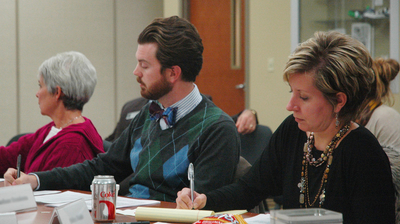Inappropriate remarks on nonprofit boards
If you serve as a director on a nonprofit board, you should know the types of remarks that are inappropriate during discussion at a meeting. Robert’s Rules of Order and the common parliamentary law it is based on require that:
- Directors on a board must be courteous to one another.
- They must speak to the issues, and not to personalities.
- They must stay on topic, and keep their remarks relevant to the item at issue.
Why are these remarks inappropriate?
A list of inappropriate remarks for private nonprofit boards is given below. They are inappropriate because they are considered to be “not germane” (irrelevant) to discussion. We are offering parliamentary information here, and nothing in this post constitutes legal advice. It is a fact, however, that courts have affirmed the right of governing bodies to define the frame of reference for their discussions, and to require directors to keep their remarks “germane” (relevant). Note that the rules are slightly different for public governing bodies. See our blog post “Inappropriate Remarks on Local Government Councils.”
List of inappropriate remarks considered not germane under Robert’s Rules of Order
- Personal remarks – remarks that pertain to an individual’s appearance, background, ethnicity or other personal aspects, rather than to his/her views on issues.
- Insults, obscenity, vulgarity and personal attacks.
- Inflammatory language – remarks that incite high emotions rather than addressing the issues.
- Remarks that “impugn” (criticize) the motives of other board directors, with the exception of conflict of interest issues, for which you should have a framework set in your policies.
- Criticizing past actions of the board, with two exceptions:
- If the board itself is discussing a past action, it is fine to criticize it.
- If the director intends to propose to “amend” (change) or to “rescind” (cancel out) the action at the end of his speech, he may criticize it during his speech.
- Remarks that are not “germane” (relevant) to the discussion.
Who decides that a remark is inappropriate?
The chair of the meeting has the duty of enforcing the rules and should speak up and stop a director who makes one of these remarks. If the chair neglects to do this, any director can raise a Point of Order. When that happens, the chair makes a ruling as to whether the remark can be allowed in discussion.
Any two directors can challenge the chair’s ruling by appealing it. In that case, the board will decide, by majority vote, whether the remark can be made. There are no “parliamentary police”—it is the board itself that interprets its own rules, based on its chosen parliamentary authority, and decides what remarks can be allowed in discussion, and what not. The board is the final authority—subject of course to any legal advice you receive from your attorney.
Note that Appeals pertaining to language and decorum may not be debated. It is just a straight up/down vote. Learn more about Point of Order and Appeal here.
Do these rules apply to the members of our organization as well?
Yes, ordinary members must also follow these rules as well as directors of the board. If your nonprofit organization serves the public, however, and invites members of the public to speak at your meetings, the rules may be different. See our blog post “Inappropriate Remarks on Local Government Councils” for details.
Where can I find the inappropriate remarks in Robert’s Rules of Order?
You can find the rules about these remarks in Robert’s Rules of Order Newly Revised, 12th edition, the current and authorized version of Robert’s Rules, in Sections 43:19 – 28.


